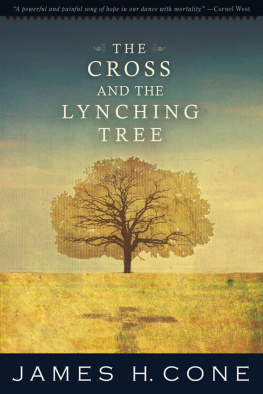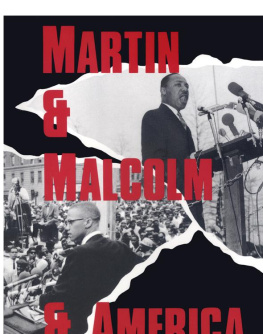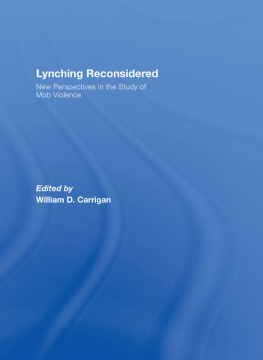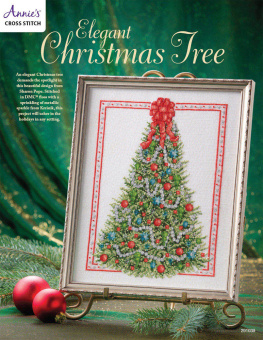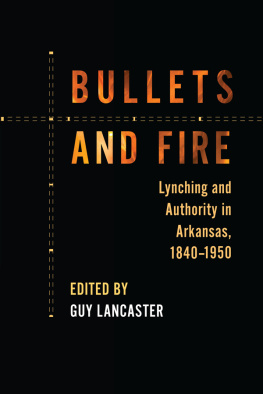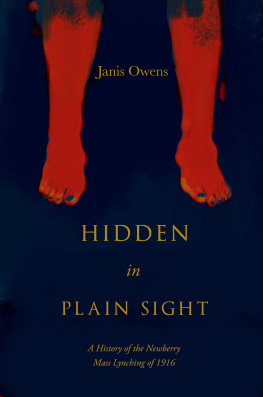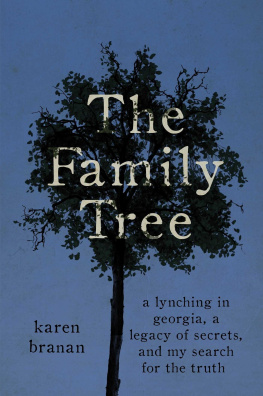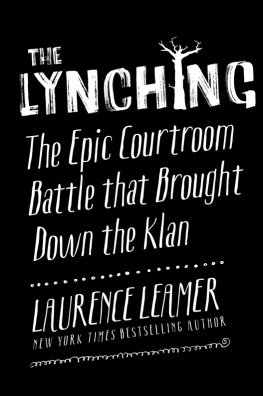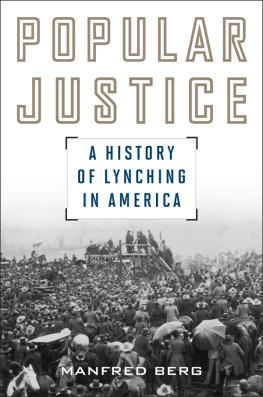Advance Praise for
The Cross and the Lynching Tree
Once again James Cone demonstrates why he is indispensable as an interpreter of faith, race, and the American experience. Growing up in the shadow of the lynching tree, he reminds us how that darkness falls across our political and cultural landscape todayand how, nonetheless, there is redemption in remembrance.
Bill Moyers
Journalist
James Cone has rescued the cross from formulaic theologies of salvation by proxy. His brave book lights fires of inquiry on the mysterious bond between suffering and love. After reading it, no aspiring Christian or christian can pretend that the lynching tree is about someone other than ourselves.
Taylor Branch
Author, Parting the Waters: America in the King Years, 1954-63
The Cross and the Lynching Tree represents the coming together of the major strands of James Cones illustrious work in black theology. No one has explored the spiritual world of African Americans with the depth or breadth of Cone. Here he turns his attention to two symbols that dominated not only the spiritual world but also the daily life of African Americans in the twentieth century. In their inextricable tie, he finds both the terror and the hope that governed life under violent racism as well as potent symbols of the African American past and present in the United States.
Henry Louis Gates, Jr.
Alphonse Fletcher University Professor, Harvard University
James Cone is a world-historical figure in twentieth-century Christian theology. The Cross and the Lynching Tree is a powerful and painful song of hope in our dance with mortalitya song Cone courageously has led for over forty years!
Cornel West
Princeton University
As James Cone shows, the thousands of black men and women who died on lynching trees were the body of Christ crucified all over again. The lynching tree is our American cross. Yet a resistance to racism that bears the cross, as in Martin Luther Kings vision, can overcome the lynching treeand its successors in our slums, prisons, and execution chambers. Cones work is devastating and redemptive.
Jim Douglass
Author, JFK and the Unspeakable
This is a book that doctors of democracy, justice, and compassion have prescribed to help us deal with our countrys malaise of anger, violence, and amnesia. It forces us to acknowledge the horrors of the past and to see more clearly the mutant forms of racism in the present. Then, it shows us how Grace upstages disgrace through the power of the Cross. It points a way toward forgiveness, reconciliation, and the restoration of the beloved community.
Rev. Dr. James A. Forbes, Jr.
Senior Minister Emeritus, Riverside Church, New York City
The Cross and the Lynching Tree is essential reading, both for its impeccable scholarship and its refusal-to-look-away-theology. James Cone, one of the worlds most respected liberation theologians, informs religious scholars as well as lay audiences about the cruel violence African Americans experienced on a colossal scale and on a continual basis. When the cross and the lynching tree are placed side by side, there is no way to deny the agony.
Katie G. Cannon
Annie Scales Rogers Professor of Christian Ethics, Union Presbyterian Seminary
James Cone teaches us still. In this powerful and personal theological work, Cone exposes not only the deep anxiety that continues to throb beneath our national amnesia about lynching and race, but also the failure of the Christian imaginationthe failure of Christian theology. At the heart of Cones critique lies a passionate quest and challenge for the beloved community. James Cone teaches us still. Will we finally learn?
M. Shawn Copeland
Associate Professor of Systematic Theology, Boston College
This book will upset your equilibrium in all the best ways, inviting you to think, challenging you to act. James Cone mines the deep insight of poetry and proclamation, song and sermon to compel us to revisit the cross and the lynching tree as poignant symbols of suffering and struggle. His book is an important reminder that the quest for a post-racial society must pass through parts of American history we do not want to claim as our own.
Robert Michael Franklin
President, Morehouse College
James Cone challenges us all to join him in the necessary, relentless wrestling with the blind and fallen angels of the white American Christian churches that has marked his life for decades. Moving deep into the broken heart of our long, often brutally racialized national journey Cone focuses on the often-denied terrorism of lynching and on the need for all of usespecially those who claim to be followers of Jesusto confront the Lynching Tree both as a reality of American life and history, and as a paradoxical, possible source of redemptive transformation for a wounded nation.
Vincent Harding
Chairperson, The Veterans of Hope Project
The Cross and the Lynching Tree is a disturbing and yet hopeful meditation upon some of the ugliest and most barbaric practices in our countrys tortured racial history. James Cone compels us to confront the horror of lynching with unflinching honesty and profound faith. This seminal work is a worthy addition to his lifelong project of relentless truth-telling with matchless courage.
Bryan N. Massingale
Marquette University
Founded in 1970, Orbis Books endeavors to publish works that enlighten the mind, nourish the spirit, and challenge the conscience. The publishing arm of the Maryknoll Fathers and Brothers, Orbis seeks to explore the global dimensions of the Christian faith and mission, to invite dialogue with diverse cultures and religious traditions, and to serve the cause of reconciliation and peace. The books published reflect the views of their authors and do not represent the official position of the Maryknoll Society. To learn more about Maryknoll and Orbis Books, please visit our website at www.maryknollsociety.org.
Copyright 2011 by James H. Cone
Published by Orbis Books, Box 302, Maryknoll, NY 10545-0302.
All rights reserved.
Permissions to quote copyrighted works appear on p. xii. Every effort has been made to clear permission for copyrighted material. We will gladly rectify any oversights in a future reprinting.
No part of this publication may be reproduced or transmitted in any form or by any means, electronic or mechanical, including photocopying, recording, or any information storage or retrieval system, without prior permission in writing from the publisher.
Queries regarding rights and permissions should be addressed to:
Orbis Books, P.O. Box 302, Maryknoll, NY 10545-0302.
Manufactured in the United States of America
Library of Congress Cataloging in Publication Data
Cone, James H.
The cross and the lynching tree / James H. Cone.
p. cm.
Includes bibliographical references and index.
ISBN 978-1-57075-937-6 (cloth); e-ISBN 978-1-60833-001-0
1. African AmericansReligion. 2. Jesus ChristCrucifixionHistory of
doctrines. 3. LynchingUnited StatesHistory. I. Title.
BR563.N4C648 2011
277.30808996073dc22
2011010630
To the memory of Black People
whose lives were lost on the Lynching Tree
They put him to death by hanging him on a tree.
Acts 10:39
The South is crucifying Christ again By all the laws of ancient rote and rule... Christs awful sin is that hes dark of hue, The sin for which no blamelessness atones;... And while he burns, good men, and, women too, Shout, battling for his black and brittle bones.
Christ Recrucified, Countee Cullen, 1922
Southern trees bear strange fruit, Blood on the leaves and blood at the root, Black body swinging in the Southern breeze, Strange fruit hanging from the poplar trees.
Strange Fruit, Abel Meeropol

